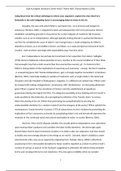AQA A2 English Literature Centre 40107: Poetry NEA; Thomas Baines (2338)
Using ideas from the critical anthology to inform your argument, explore the view that Eve’s
femininity is the sole instigating factor in encouraging Adam to share in her sin
Arguably, the ease with which Milton’s narcissistic Eve, ‘as an immoral and dangerous
seductress’ (Bertens, 2001), is beguiled by Satan and subsequently mirrors his persuasive rhetoric
establishes compelling grounds to characterise her as the instigator of mankind’s fall. However,
whether such an act of independence, although typically inciting disorder in patriarchal literature,
can then be considered the cause of Adam’s own transgression, is made ambiguous by Milton’s
depictions of Satan, as an irresistible conniver, and Adam, as a weak and ignorant steward of God’s
creation - both of whom seemingly shift responsibility away from Eve alone.
Eve’s independence can perhaps be traced back to her separation from Adam; Gallagher
(1990) discerns deliberate misinterpretation in Eve’s reaction to the crucial conditional ‘if thou think,
trial unsought may find us both secured than thus warned thou seemst, go’. To feminist critics,
Milton’s interpretation of the implications of exercising such autonomy - namely, the fall of mankind
- is unsurprising given that ‘female independence…gets a strongly negative connotation’ in literature
(Bertens, 2001), historically leading to suicides of matriarchs such as Virgil’s Dido in The Aenid and
Cleopatra and Lady Macbeth in Shakespeare’s tragedies. In a different but related way, Milton could
be charged with making ‘independence’ synonymous with ‘disobedience’, an interesting distinction
given Milton’s support for the overthrow of Charles I and the establishment of republican
government during the English Civil War. The dangerous possibility of Eve thinking only for herself is
made possible by this distinction, thus prompting the initiation of the ‘female charm’ to seduce
Adam into sharing in her sin. Rather than portraying Eve sympathetically by excusing her
understandable deviation (to a modern reader) from the misogyny of the period, Milton upholds the
contemporary ‘Grand Narrative’ (Lyotard, 1979) of subservience to one’s husband by presenting the
implications of Eve’s autonomy as chaotic (in precipitating Adam’s sin) and henceforth expresses the
necessity of ‘the continued social and cultural domination of males’ in society (Bertens, 2001).
However, More (1653) disputes whether Eve actually prefers independence over submission
upon hearing Adam’s guidance and considers the latter hardly blameless: ‘the divine light again
blamed Adam that he kept his feminine faculties in no better order nor subjection, that they should
so boldly and overcomingly dictate to him things as are not fit’. Certainly, Adam’s inability to assert
what feminist critics may see as superiority originating from ‘biology’ (Barry, 2002) in effectively
acquiescing to Eve’s foreseeable deception by Satan could be regarded as a failure to enforce God’s
creation of woman as partner to her husband, suggesting he ultimately fell without being tempted
by Eve and consequently by his own impotence. This view gains credibility when we consider
1





